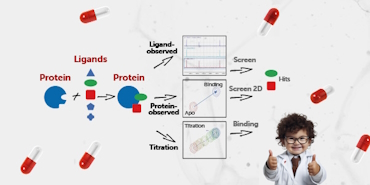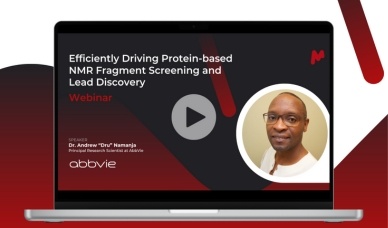Fast and Efficient Fragment-Based Lead Generation by Fully Automated Processing and Analysis of Ligand-Observed NMR Binding Data
| Title: | Fast and Efficient Fragment-Based Lead Generation by Fully Automated Processing and Analysis of Ligand-Observed NMR Binding Data |
| Authors: | Chen Peng, Alexandra Frommlet, Manuel Perez, Carlos Cobas, Anke Blechschmidt, Santiago Dominguez and Andreas Lingel |
| Date: | 2016/09/13 |
| Reference: | Journal of Medicinal Chemistry, 2016, 59 (7), pp 3303–3310 |
| DOI: | http://dx.doi.org/10.1021/acs.jmedchem.6b00019 |
| Download link: | http://pubs.acs.org/doi/pdf/10.1021/acs.jmedchem.6b00019 |
ABSTRACT
NMR binding assays are routinely applied in hit finding and validation during early stages of drug discovery, particularly for fragment-based lead generation. To this end, compound libraries are screened by ligand-observed NMR experiments such as STD, T1ρ, and CPMG to identify molecules interacting with a target.
The analysis of a high number of complex spectra is performed largely manually and therefore represents a limiting step in hit generation campaigns. Here we report a novel integrated computational procedure that processes and analyzes ligand-observed proton and fluorine NMR binding data in a fully automated fashion. A performance evaluation comparing automated and manual analysis results on 19F- and 1H-detected data sets shows that the program delivers robust, high-confidence hit lists in a fraction of the time needed for manual analysis and greatly facilitates visual inspection of the associated NMR spectra. These features enable considerably higher throughput, the assessment of larger libraries, and shorter turn-around times.If you are interested in this subject you can find out more about Mnova Screen software here.




